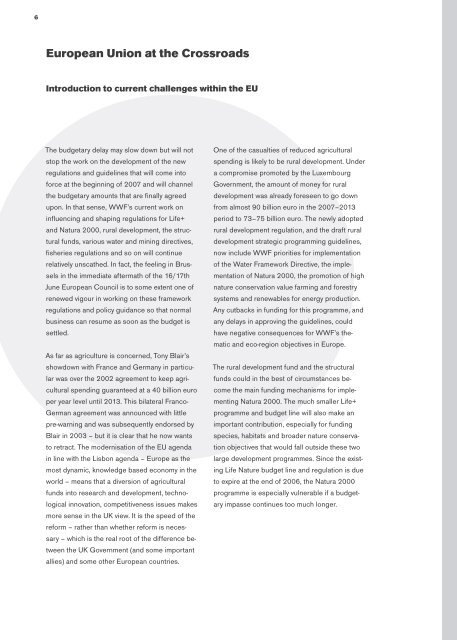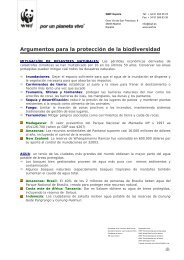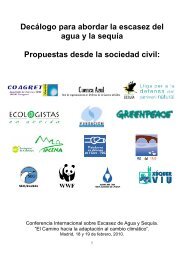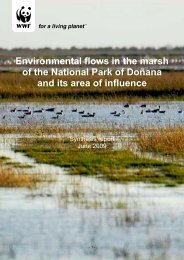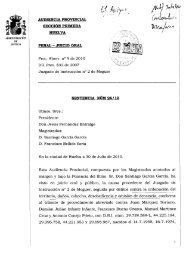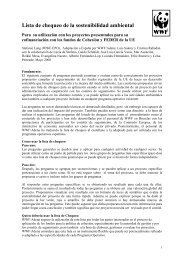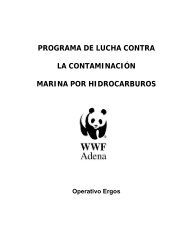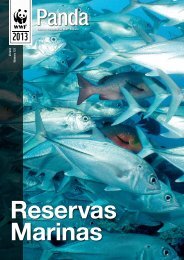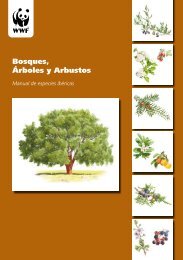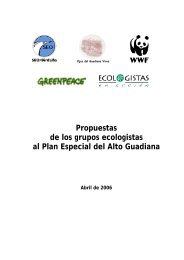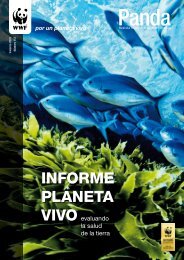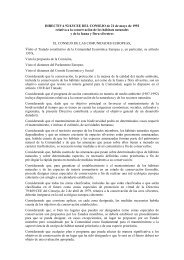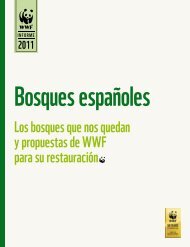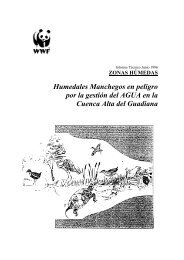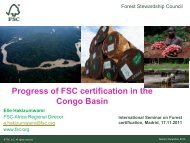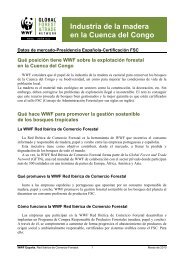Conflicting EU Funds - WWF
Conflicting EU Funds - WWF
Conflicting EU Funds - WWF
You also want an ePaper? Increase the reach of your titles
YUMPU automatically turns print PDFs into web optimized ePapers that Google loves.
6<br />
European Union at the Crossroads<br />
Introduction to current challenges within the <strong>EU</strong><br />
The budgetary delay may slow down but will not<br />
stop the work on the development of the new<br />
regulations and guidelines that will come into<br />
force at the beginning of 2007 and will channel<br />
the budgetary amounts that are finally agreed<br />
upon. In that sense, <strong>WWF</strong>’s current work on<br />
influencing and shaping regulations for Life+<br />
and Natura 2000, rural development, the structural<br />
funds, various water and mining directives,<br />
fisheries regulations and so on will continue<br />
relatively unscathed. In fact, the feeling in Brussels<br />
in the immediate aftermath of the 16/17th<br />
June European Council is to some extent one of<br />
renewed vigour in working on these framework<br />
regulations and policy guidance so that normal<br />
business can resume as soon as the budget is<br />
settled.<br />
As far as agriculture is concerned, Tony Blair’s<br />
showdown with France and Germany in particular<br />
was over the 2002 agreement to keep agricultural<br />
spending guaranteed at a 40 billion euro<br />
per year level until 2013. This bilateral Franco-<br />
German agreement was announced with little<br />
pre-warning and was subsequently endorsed by<br />
Blair in 2003 – but it is clear that he now wants<br />
to retract. The modernisation of the <strong>EU</strong> agenda<br />
in line with the Lisbon agenda – Europe as the<br />
most dynamic, knowledge based economy in the<br />
world – means that a diversion of agricultural<br />
funds into research and development, technological<br />
innovation, competitiveness issues makes<br />
more sense in the UK view. It is the speed of the<br />
reform – rather than whether reform is necessary<br />
– which is the real root of the difference between<br />
the UK Government (and some important<br />
allies) and some other European countries.<br />
One of the casualties of reduced agricultural<br />
spending is likely to be rural development. Under<br />
a compromise promoted by the Luxembourg<br />
Government, the amount of money for rural<br />
development was already foreseen to go down<br />
from almost 90 billion euro in the 2007–2013<br />
period to 73–75 billion euro. The newly adopted<br />
rural development regulation, and the draft rural<br />
development strategic programming guidelines,<br />
now include <strong>WWF</strong> priorities for implementation<br />
of the Water Framework Directive, the implementation<br />
of Natura 2000, the promotion of high<br />
nature conservation value farming and forestry<br />
systems and renewables for energy production.<br />
Any cutbacks in funding for this programme, and<br />
any delays in approving the guidelines, could<br />
have negative consequences for <strong>WWF</strong>’s thematic<br />
and eco-region objectives in Europe.<br />
The rural development fund and the structural<br />
funds could in the best of circumstances become<br />
the main funding mechanisms for implementing<br />
Natura 2000. The much smaller Life+<br />
programme and budget line will also make an<br />
important contribution, especially for funding<br />
species, habitats and broader nature conservation<br />
objectives that would fall outside these two<br />
large development programmes. Since the existing<br />
Life Nature budget line and regulation is due<br />
to expire at the end of 2006, the Natura 2000<br />
programme is especially vulnerable if a budgetary<br />
impasse continues too much longer.


